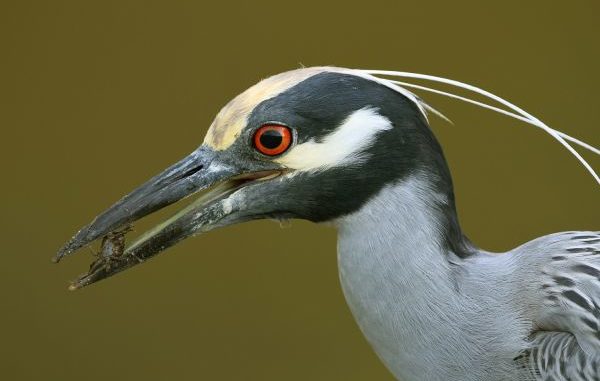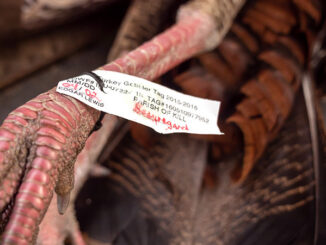
‘Gros bec’ still draws frequent offenders
Fish and wildlife violations investigated by wildlife enforcement agents in Louisiana cover a wide range of offenses. Where an agent lives and works determines what types of infractions he or she must address.
For example, agents in South Louisiana spend lots of time dealing with the commercial fishing industry. The North Louisiana guys don’t, simply because not much commercial fishing goes on north of the coast and Atchafalaya Basin.
Cultural differences also determine which laws get broken and how. North and South Louisiana are two very different worlds in many ways, with different violation problems.
The best example I can offer to substantiate that claim is hunting “gros becs.”
For the folks who don’t know, “gros bec” is Cajun French. Pronounced “grow beck,” it translates to “big beak,” and is the Cajun common name for the yellow-crowned night heron. Herons, along with all other migratory non-game birds are protected by federal regulations.
Historically gros bec and a few other herons and ibis were highly prized table fare in East-Central and South Louisiana, particularly in the Cajun parishes.
A fellow agent born and raised in Avoyelles Parish once told me gros becs were a source of fresh summertime meat for poor Cajun families, and when he was a child his father shot them for the table.
Working in Avoyelles Parish in the late ’70s and early ’80s, I found out pretty quickly just how enthusiastic some folks were about preserving the gros bec hunting tradition.
The southeast United States is the summer range and nesting ground for many herons, ibis and cranes, so the illegal hunting of the birds went on all summer. The fledgling birds just out of the nest are supposedly the tastiest.
Within two weeks of being hired, I assisted two veteran agents in a gros bec case, and in the following years in Avoyelles Parish I spent many hot, miserable summer afternoons feeding mosquitos and stepping over cottonmouths in pursuit of gros bec hunters.
But one particular case comes to mind.
Near Lake Pearl in Avoyelles Parish lived a Cajun fellow who was in his 60s at the time. He was one of only a handful of people I encountered in Avoyelles who could not speak English, only Cajun French. We’ll call him Gaston.
Gaston sometimes reported violations, particularly night hunting in the area where he lived. My working partner, Agent Joe Lemoine, was an Avoyelles native and spoke fluent Cajun French. Gaston did not have a telephone, but somehow Joe would get the word when Gaston wanted to talk so we would pay a visit and get the latest information from him from time to time.
One summer afternoon we were working gros bec hunters in the Lake Pearl area. Lake Pearl is a shallow, knee-deep swampy area with lots of willow and buttonwoods. The shallow, muddy water teems with crawfish. It is prime rookery habitat for ibis, cranes and herons. In late afternoon when the heat dissipates a little, both adult and fledgling birds become active, calling and flying around the rookery.
On this particular day, when the afternoon flight started so did the shooting. Two shotguns were pounding away within walking distance of where I was parked.
This was back before cell phones, and young agents did not get “luxury items” such as handheld radios. So after transmitting my location, situation and intentions from the truck’s two-way radio, I hit the swamp on foot.
It sometimes amazed me just how brazen some poachers could be, and this was one of those times. These two shooters blasted away with 12-gauge shotguns, totally unconcerned, and it sounded like duck season was open in July.
I had no trouble homing in on the continuous gunfire, and was sure Agent Lemoine and the other guys responding to back me up would not, either.
Slowly slipping through the knee-deep water, it wasn’t long before I spotted two men in an opening in the willows. They were shooting away at the passing flights of gros becs.
During my time in Avoyelles Parish, I had picked up on a few Cajun words, and after one shot I heard one man tell the other in Cajun this was an old bird. Disappointed, I suppose, that he had accidentally killed a mature bird and not a more-desirable fledgling. I could also see a number of dead birds hung from willow limbs where the men were placing them after retrieval.
I watched the show for a while, hoping my backup would arrive but knowing it would take time for any other agent to get here. With all the evidence needed, I decided to move in and stop the killing.
Slipping closer, it soon became apparent these were elderly men. One had snow-white hair and was slender; the other was gray-headed, short and a bit on the heavy side. More dead birds were now visible, hanging from the limbs.
At a distance of about 20 yards, they spotted me and I shouted “Game warden; stay where you are!” which must translate to “Ready, set, go!” in Cajun because both those old boys took off running as best they could.
Now I was never the fastest guy on the track, but I could catch a short-legged old fellow slogging through mud and knee-deep water, and catch the short guy I did. He put up a little resistance, but was already pretty winded from the race and gave up quickly.
I spun him around and, lo and behold, it was old Gaston.
His white-haired partner kept going, so there stood Gaston and me with communications at a stand still. He was chattering away in Cajun, saying I know not what.
Along about then Agent Lemoine showed up. He had located my truck, walked in and homed in on the racket. A translator was a blessing, and we soon had Gaston calmed down and agreeing to walk out to the vehicles with us.
I no longer recall the exact number, but we gathered 20 or more dead gros becs, placed them in a sack Gaston carried for that very purpose and headed for the trucks. It was dark by then, and on the way out we met John Mullins, a wildlife biologist with LDWF’s Wildlife Division. John had heard the radio traffic and drove over to help.
We made it back to the trucks and issued Gaston his citation for this federal violation. The nearest federal-approved jail was in Alexandria, so we did not arrest on federal violations in most cases. Agent Lemoine put Gaston in his truck and drove him home.
The next time I saw Gaston was at arraignment in U.S. Magistrate’s Court in Alexandria. He brought along a translator, a very nervous-looking older man with snow-white hair I recognized immediately. He had to identify himself to the court, and we now knew who he was.
Gaston entered a guilty plea and was ordered to pay a stiff fine. He was also placed on probation for a few years with loss of hunting privileges as a term of probation.
I had a discussion with the assistant U. S. attorney about the white-haired man. It was taken under consideration, but the U. S. Attorney’s Office decided not to charge and prosecute. I suppose they felt positive identification would be a problem.
Not surprisingly, we lost Gaston as an informant and made no more visits to his home.
But the gros bec battles were far from over.


